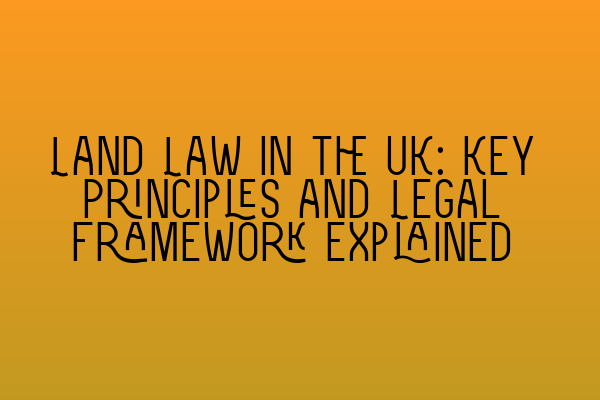Land Law in the UK: Key Principles and Legal Framework Explained
Welcome to SQE Property Law, your trusted solicitors specializing in land law. In this blog post, we will take you on a comprehensive journey through the key principles and legal framework of land law in the UK. Whether you’re a seasoned property investor, a first-time buyer, or simply curious about the intricacies of land law, this article aims to provide clarity and guidance. So, let’s dive in!
The legal framework surrounding land in the UK is complex and multifaceted, with a rich history dating back centuries. It encompasses a wide range of legal concepts and principles that govern the ownership, use, and transfer of land. Understanding these key principles is essential for anyone involved in property transactions or disputes.
One fundamental principle of land law is that land can be owned outright, known as freehold ownership, or held under certain limitations, known as leasehold ownership. Freehold ownership grants the owner permanent and absolute rights over the land, subject to any legal restrictions or encumbrances. On the other hand, leasehold ownership involves a lease agreement between the landowner (known as the freeholder) and the occupier (known as the leaseholder), with specific terms and conditions governing the use and duration of the lease.
When it comes to the transfer of land ownership, the concept of conveyancing comes into play. Conveyancing is the legal process of transferring the title of land from one party to another. This process includes various steps such as carrying out property searches, drafting contracts, and registering the transfer with the Land Registry. Our team of expert solicitors at SQE Property Law have extensive experience in handling all aspects of conveyancing, ensuring a smooth and hassle-free transaction for our clients.
Another crucial aspect of land law is the concept of property rights and interests. These rights and interests can take various forms, such as easements, covenants, and mortgages, which are registered or unregistered on the title. Easements, for example, are rights that one party has over the land of another party, such as a right of way or a right to use a shared driveway.
Covenants, on the other hand, are legally binding obligations imposed on the owner of the land, usually for the benefit of a neighboring property or a community at large. Examples of common covenants include restrictions on building height, noise levels, and the use of the property. Understanding these rights and interests is crucial in property transactions as they can have a significant impact on the value and potential use of the land.
When disputes arise in relation to land, the legal system provides mechanisms for resolving these conflicts. The courts play a vital role in interpreting and applying land law principles to specific cases. Some common types of land disputes include boundary disputes, adverse possession claims, and disputes over rights of way. Our team of expert solicitors at SQE Property Law have extensive experience in dealing with land disputes and can provide you with sound legal advice and representation.
In recent years, the impact of technology and digitalization on land law cannot be overlooked. The emergence of blockchain technology has revolutionized the way land transactions are recorded and verified. Blockchain provides a secure and transparent system for recording and tracking property ownership, reducing the risk of fraud and ensuring the integrity of the land registry. At SQE Property Law, we stay up to date with the latest technological advancements to provide our clients with cutting-edge solutions and an efficient and secure service.
As you can see, land law is a complex and ever-evolving area of the legal system. Whether you’re buying or selling a property, resolving a dispute, or seeking legal advice on property matters, it is vital to consult with experienced solicitors who specialize in land law. With our expertise and in-depth knowledge, the team at SQE Property Law can guide you through the intricacies of land law and ensure your interests are protected.
If you’re preparing for the SQE 1 exam, we also offer comprehensive preparation courses and practice exam questions to help you succeed. Whether you need to brush up on your knowledge of land law or other areas of the syllabus, our courses and mock exams are designed to provide you with the tools and confidence to excel in the examination. Check out our SQE 1 Practice Exam Questions and SQE 1 Practice Mocks FLK1 FLK2 to kickstart your preparation today!
For those preparing for the SQE 2 exam, we also offer tailored preparation courses to ensure you are fully equipped with the necessary skills and knowledge to ace the exam. Our expert tutors will guide you through the key topics, provide practical examples, and offer invaluable advice to help you succeed. Don’t miss out on our SQE 2 Preparation Courses – enroll now and take a step closer to your legal career!
With the ever-changing landscape of land law, it is crucial to stay updated on the latest developments and exam dates. The SRA SQE Exam Dates are released periodically, and it’s essential to plan your preparation and exam strategy accordingly. Stay informed and organized by checking the official exam dates regularly to ensure you are fully prepared on the day of the examination.
In conclusion, land law in the UK encompasses a vast array of principles and legal frameworks that govern the ownership, use, and transfer of land. Understanding these key principles is essential for anyone involved in property transactions or disputes. Whether you’re a property investor, a prospective buyer, or a legal professional, our team at SQE Property Law is here to assist you with our expert knowledge and tailored services. Contact us today to discuss your land law needs or to find out more about our preparation courses for the SQE exams.
